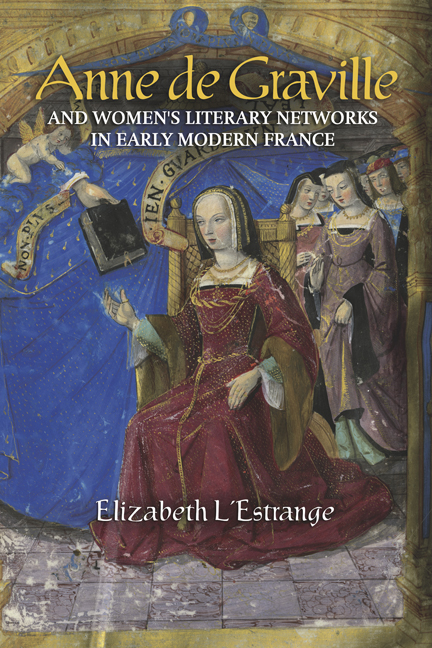Book contents
- Frontmatter
- Dedication
- Contents
- List of Illustrations
- Acknowledgements
- A Note on Citations, Translations and Transcriptions
- List of Abbreviations
- Map
- Introduction: ‘Une femme d’excellence en vertus, ma dame d’Entraigues’: Anne de Graville’s Life and Works
- PART I ANNE DE GRAVILLE: READER AND COLLECTOR
- PART II FROM READING TO WRITING: ANNE AS AUTHOR
- Conclusion: ‘Celle la qui porte le regnon’: A Last Word on Anne de Graville
- Appendix A Books Inherited, Acquired, Commissioned by or Associated with Anne de Graville
- Appendix B Inventory of the d’Urfé Library at La Bâtie, c. 1780
- Appendix C Manuscripts Containing Works by Anne de Graville
- Bibliography
- Index
- Gallica
Conclusion: ‘Celle la qui porte le regnon’: A Last Word on Anne de Graville
Published online by Cambridge University Press: 11 January 2024
- Frontmatter
- Dedication
- Contents
- List of Illustrations
- Acknowledgements
- A Note on Citations, Translations and Transcriptions
- List of Abbreviations
- Map
- Introduction: ‘Une femme d’excellence en vertus, ma dame d’Entraigues’: Anne de Graville’s Life and Works
- PART I ANNE DE GRAVILLE: READER AND COLLECTOR
- PART II FROM READING TO WRITING: ANNE AS AUTHOR
- Conclusion: ‘Celle la qui porte le regnon’: A Last Word on Anne de Graville
- Appendix A Books Inherited, Acquired, Commissioned by or Associated with Anne de Graville
- Appendix B Inventory of the d’Urfé Library at La Bâtie, c. 1780
- Appendix C Manuscripts Containing Works by Anne de Graville
- Bibliography
- Index
- Gallica
Summary
In 2018, the town library in Le Havre announced that it would be undergoing refurbishment, reopening in September 2020 with a new name, the ‘Bibliotheque Anne de Graville’. This decision puts Anne's name very much on the map in one of the Norman towns with which she and her family were closely connected. The choice of name, rather than that of her more famous bibliophile father, Louis, is evidence of an increased willingness to shine a public light on the roles played by women in history. Anne certainly merits this public accolade: her inclusion in Tory's Champfleuryand the riddle on her name in fr. 24315 show that she had earned a reputation for her learning and literary skills during her lifetime. Yet, by the early twentieth century she was criticised for her lack of style and originality and the ‘crime’ of having transformed Boccaccio's Teseida into a sentimental tale for women. Such, perhaps, are the turnings of Fortune's wheel, the cruelties of which Anne was only too aware and from which she, like Christine de Pizan, sought solace in books and writing. However, Anne's place in the wilderness cannot simply be attributed to this fickle mistress. Although the last forty or fifty years have seen scholars of art, book and literary history engage in the serious study of women as patrons and writers, Anne de Graville has continued to occupy a place on the sidelines, and the reasons for this remain largely rooted in historiography and in scholarly practices: the erasure of her first known patron, Claude of France, from the history books; the lack of scholarly editions of Anne's works (and an academic system that tends not to reward such outputs adequately); an ongoing bias towards better-known and -documented male patrons; and the restrictive nature of historical periodisation, which tends to divide the medieval from the early modern in ways that do not always fit with Anne's interests and activity.
- Type
- Chapter
- Information
- Publisher: Boydell & BrewerPrint publication year: 2023



